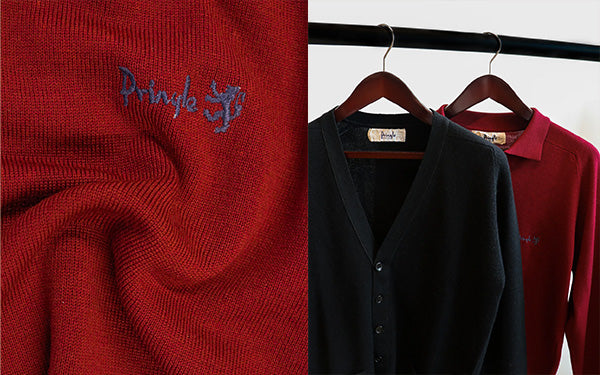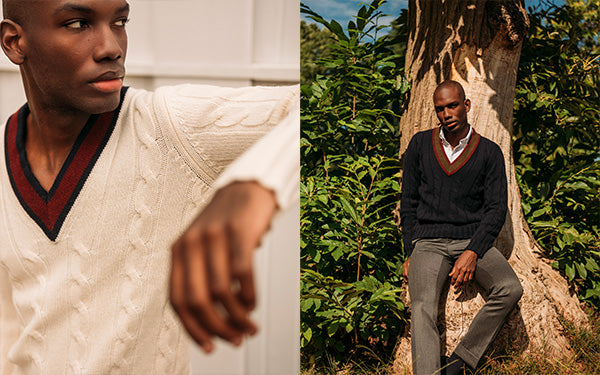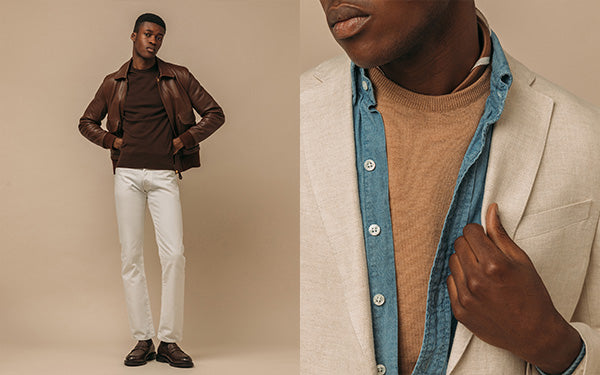
The Inspiration Behind Colhay's
Here at Colhay’s our goal is to design and produce knitwear of the very highest quality by using the finest fibres and working with some of the most skilled knitters in the world. We aim to provide our customers with the very best products. Through well-made pieces that have been designed and made to last a lifetime, we aim to reduce waste and bring back the culture of investing in garments and taking care of them over time.
This idea was inspired by founder Ronnie Chiu’s older relatives, who grew up in Hong Kong back in the fifties, sixties and seventies. In those days, Hong Kong was a British colony and so Britain had a heavy influence on Hong Kong's culture and day to day life, including Ronnie’s father’s and grandfather’s purchases.
 Left: YMCA, Salisbury Road, Hong Kong, opened 1926
Left: YMCA, Salisbury Road, Hong Kong, opened 1926
Right: a poster selling cricket gear in Hong Kong, 1960s
 Left: Queen Elizabeth II on an old Hong Kong stamp
Left: Queen Elizabeth II on an old Hong Kong stamp
Right: an old British style post office and mini cab in Hong Kong
At this time, British made implied quality and so people would save up to buy something made in the UK, which was often expensive, despite their financial circumstances. Many British brands set up shop in Hong Kong to sell their wares to locals. Having spent time and putting in considerable effort to save up the money, people felt pride in owning and wearing these British made garments and really took care of them. A lot of the time they were the only clothes they would ever own their whole lives, but they lasted their whole lives, so they were always worthwhile investments.
Before starting Colhay’s, Ronnie was given some of his grandfather’s and father’s old clothes that they had owned during this era.

Ronnie's father, 1970s, when he worked in menswear in Hong Kong before starting his own accessories business
“My father gave me everything he used to own in his younger days, including his old made in Scotland sweaters that he bought with his first pay check in his twenties,” said Ronnie. “After four to five decades of wear and hand washing and taking good care of them they are still pristine after all this time.”
"He was not well off back then, but it was the norm to save up for a long time, and buy something made in Britain, like Scottish made knitwear, that you would then wear for a lifetime and not have to replace."
“My father used to labour on how I should get shoes that are made in Northampton when I am older, knitwear from Scotland of course, shirts and tailoring from England. My grandfather was the same - he loved his Scottish tweed flat caps and his I. and R. Morley knit shirts made in Nottingham - wore them for 40-50 years. They were all available for purchase in Hong Kong department stores at that time. To my grandfather and father, it was always British made - because British made meant quality, and quality meant it would last a lifetime so you don’t have to buy twice. That was the prevailing wisdom at the time.”
"This is what we are trying to do with Colhay's - to go back to focusing on quality and producing garments that last a lifetime, not garments that just reduce carbon footprint or use organic materials; but most importantly garments that really last, like how they used to. Quality is not something that our generation like to talk about much; it is in such short supply these days." Ronnie's father's sweaters from the 1970s, both made in Scotland in the same town that Colhay's knitwear is now made
Ronnie's father's sweaters from the 1970s, both made in Scotland in the same town that Colhay's knitwear is now made
Before Colhay's began, Ronnie had been trying to find knitters in Scotland, as his family had told him many times that that was where the best knitters were.
“When I got my father’s sweaters it was evidence that what my father had always told me was true,” he said. Ronnie eventually found the town which made his father's sweaters all those years ago, and discovered that there remained a handful of small family run knitwear producers who were still making knitwear to the same exacting standards as they did when they made his father's sweaters. He worked with them to make a collection of knitwear in contemporary styles and fits - how Colhay's was born.
But why does it matter? The importance of creating such high quality products is multifaceted.
Sustainability
Many brands currently focus only on sustainable practices in the production process, for example reducing their carbon footprint, and using sustainably sourced materials. Whilst this is very important, we believe this is too narrow a view of sustainability and doesn’t help in terms of reducing waste in the long run. If something was made in an environmentally friendly way, but that thing doesn’t last, you will end up having to continually buy new pieces to replace it throughout your lifetime, and the planet’s problem with excessive waste continues.
On the other hand, producing and then encouraging people to invest only in a few, highest quality products means that you are able to wear and enjoy those pieces for a lifetime, never needing to replace them, and then passing them on. This puts a stop to the cycle of endless consumption, and a reflection of the old way of buying clothes as many from generations before ours will be able to attest.
In the past, the way people invested in clothes was similar to how people invest in houses now – you would think long and hard before purchasing, spend a long time doing due diligence, looking at all of the details to be sure that only the finest materials were used. You would then diligently maintain your purchase for many years. Why? Because just like a house, clothes were expensive, and once you’ve bought it, you are fully expecting to enjoy it for life.
 Ronnie's father's deep red polo shirt from the 1970s, made in Scotland using what was then called "100% virgin new wool" - more commonly known as merino wool nowadays
Ronnie's father's deep red polo shirt from the 1970s, made in Scotland using what was then called "100% virgin new wool" - more commonly known as merino wool nowadays  A close up of Ronnie's father's red polo shirt from the 1970s, still in pristine condition after all this time. Over the decades of handwashing, it has taken on a robust yet soft, dry handle
A close up of Ronnie's father's red polo shirt from the 1970s, still in pristine condition after all this time. Over the decades of handwashing, it has taken on a robust yet soft, dry handle
Restoring the Dignity in Craft
We believe there is something truly special about our knitters’ skills and craftsmanship. Having the skills, knowledge and experience to create such high quality knitwear that lasts decades, is something to be proud of. There are many professions and skills similar to knitting in the UK that are incredibly rare and special, but far less appreciated today than they would have been fifty years ago. At Colhay’s we want to remind the world that this craftsmanship still exists in Britain and reinforce these people’s skills to our customers and bring attention and pride back to these well-honed crafts.
Connecting People Across the Globe
One of the most remarkable things about heirloom garments is the way they can connect people. For Ronnie, receiving the package of his father’s sweaters was a special moment and something deeply personal. But it’s not simply handing down garments through generations of a family, they can also connect people who aren’t relatives.
The manager at the factory where we produce our knitwear believes he had a hand in making Ronnie’s father’s sweaters all those years ago. Having seen them he knows where they were made and when, and can connect himself back to this time, although it was many moons ago! Realising someone else living thousands of miles away cared enough about a garment he had produced to put in the effort to look after it for decades was another special moment. It meant that all of the time and skills he put into creating the garment were worth it because it was being truly appreciated by somebody else, similar to him in age, on the other side of the globe, and it has now been passed onto his son.  Close up of the collar of Ronnie's father's black cardigan, made in Scotland in the 1970s
Close up of the collar of Ronnie's father's black cardigan, made in Scotland in the 1970s  Close up of the fabric of Ronnie's father's black cardigan, made in Scotland in the 1970s
Close up of the fabric of Ronnie's father's black cardigan, made in Scotland in the 1970s
Re-establishing the Intrinsic Values of Caring for Possessions
At Colhay’s we believe there is an intrinsic value in saving for something that you go on to nurture and take care of, as is needed with knitwear. This creates a more mindful approach and can make you more appreciative of what you own. We believe it’s a useful discipline to have and can contribute to a slower, more patient and grateful way of life. If you have spent a lifetime caring for something, you are much more likely to have a deeper connection for that thing and show gratitude for it.
With this in mind, our knitwear are all high quality heirloom pieces in classic styles that we think will continue to look sophisticated for decades to come, meaning there is no need to rush to replace them quickly. Take a look at our cashmere, superfine lambswool, extrafine merino and cashmere silk collections.


